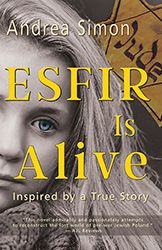J. L. Witterick, a Chinese Canadian whose only ties to Judaism are her close friends, has written a powerful novel, My Mother’s Secret, set in the dark years of the Holocaust and based on actual historical events. Witterick felt connected to the Jewish plight because her own people suffered under the Japanese atrocities during World War II.. The book describes the decision of Franciszka and her daughter Helena to hide and shelter nine people in their small house, despite the threat of death. It is based on the 2009 documentary “The No. 4 Street of Our Lady” in which the mother and daughter actually saved half of the Jewish survivors of Sokal, Poland, whose original Jewish population was 6,000.
Four different perspectives are presented in the book: the rescuers, Helena and her mother Franciszka; Bronek, the leader of his family and his sister-in-law, hidden in the pigsty; Mikolai, who with his parents are hidden in a makeshift cellar; and Vilheim, a German soldier defector, hidden in the attic. The secret to their survival, as one character says, is that “[t]his is a world where to be insignificant, necessary, or connected are the best ways to survive.”
The novel makes powerful statements about love, sacrifice, and courage through the characters. What resonates with the reader is how ordinary people like Franciszka and Helena, uneducated peasants, can choose to become extraordinary. The author expresses the desperation of those in hiding when Bronek says, “It feels like someone has torn the limbs from my body. I can hardly breathe. The crying and hysteria all around me seem like background noise.” Helena understands everyone’s predicament. “It is exhausting to live with constant fear, tempered by nothing but hope,” she says.
My Mother’s Secret is a profound and captivating story of two selfless heroines who put other peoples’ lives and safety before their own. Within the horrific events of the Holocaust there was still hope, and people who rose to greatness with their resilience, courage, and strength.
Interview
Elise Cooper had the pleasure of interviewing J. L. Witterick about her ability to turn a true story into a novel.
Elise Cooper: Why did you decide to write this book?
J. L. Witterick: After I saw this documentary in the basement of a Canadian synagogue I knew this story had to be told. I thought about my own background since my family immigrated to Canada from Taiwan with basically nothing. I grew up with very little and for awhile felt like an outsider, not understanding or speaking the language. I was able to relate to being an outcast.
Elise Cooper: Was the quote “It feels like someone has torn the limbs from my body. I can hardly breathe. The crying and hysteria all around me seem like background noise,” from an actual Holocaust survivor?
JLW: No. The inspiration I got for this quote was from Bibi Netanyahu. His brother, Jonathan, was killed in action while rescuing those hijacked in Uganda. This is what Bibi had said.
EC: Why did you reduce the amount of characters from the actual number saved, fifteen, to nine?
JLW: I wanted the reader to be able to identify with everyone. I wanted the readers to really feel for the characters so I had to reduce the number saved. With that said, the experiences and the incidents of the characters are true. The major events all happened. I am hoping that this will likely allow them to live on forever.
SPOILER ALERT
EC: Why did you change the lives of some of the characters and what were the changes?
JLW: I am someone who likes happy endings and became immersed in my characters. The shooting at the factory and the choice of giving up a child is true. Unfortunately, the German soldier did not survive and was shot by the Russians. I changed his ending because I wanted the soldier to experience freedom after being cooped up in the attic. So I made it happen. Regarding Franciszka and Helena, they did escape. They actually had to, since the Russians would have punished them for saving a German soldier and they would have had to endure the wrath of some of the Polish people who were still anti-Semitic. I want the book to stand the test of time so I tried to make it historically accurate.



